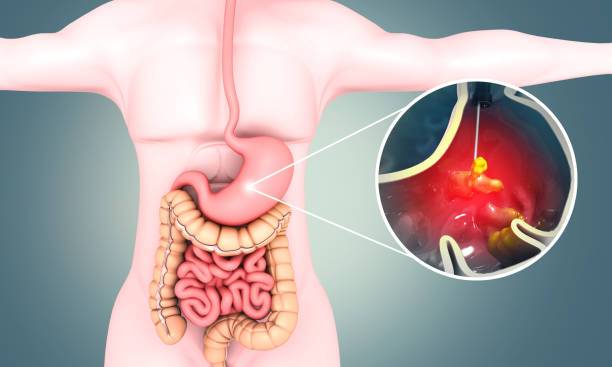Gastric Ulcers: Causes, Symptoms, Treatment, and Prevention
Introduction:
Gastric ulcers, also known as peptic ulcers, are open sores that develop on the lining of the stomach. These ulcers can cause significant discomfort and complications if left untreated. Understanding the causes, symptoms, treatment options, and prevention methods for gastric ulcers is essential for managing and mitigating their impact on one's health and quality of life.
1. Understanding Gastric Ulcers:
Gastric ulcers occur when the protective lining of the stomach is damaged, allowing stomach acid to erode the underlying tissue. The primary cause of gastric ulcers is the bacterium Helicobacter pylori (H. pylori), which infects the stomach lining and weakens its protective barrier. Other factors that can contribute to the development of gastric ulcers include:
- Nonsteroidal anti-inflammatory drugs (NSAIDs): Prolonged use of NSAIDs, such as aspirin and ibuprofen, can irritate the stomach lining and increase the risk of ulcer formation.
- Excessive alcohol consumption: Alcohol can irritate the stomach lining and lead to the development of ulcers.
- Smoking: Smoking cigarettes can impair the healing process of gastric ulcers and increase the risk of complications.
- Stress: While stress alone does not cause gastric ulcers, it can exacerbate symptoms and delay healing.
2. Symptoms of Gastric Ulcers:
The symptoms of gastric ulcers can vary depending on the severity of the ulcer and individual factors. Common symptoms include:
- Burning pain in the abdomen, typically between the breastbone and belly button
- Nausea and vomiting
- Bloating or feeling full quickly after eating
- Loss of appetite
- Weight loss
- Dark, tarry stools (indicating bleeding)
- Fatigue and weakness (due to blood loss)
It is essential to seek medical attention if you experience persistent symptoms of gastric ulcers, as untreated ulcers can lead to complications such as bleeding, perforation (a hole in the stomach lining), or obstruction (blockage in the digestive tract).
3. Diagnosis of Gastric Ulcers:
Diagnosing gastric ulcers usually involves a combination of medical history, physical examination, and diagnostic tests. Your doctor may perform the following tests to confirm the presence of an ulcer and identify the underlying cause:
- Endoscopy: A thin, flexible tube with a camera (endoscope) is inserted into the esophagus to visualize the stomach lining and identify ulcers.
- Upper gastrointestinal (GI) series: This imaging test involves drinking a contrast solution followed by X-rays to examine the esophagus, stomach, and small intestine for abnormalities.
- H. pylori tests: These tests, such as breath tests or stool tests, detect the presence of H. pylori bacteria in the stomach lining.
Once diagnosed, treatment for gastric ulcers aims to relieve symptoms, promote healing, and prevent complications.
4. Treatment Options for Gastric Ulcers:
The treatment of gastric ulcers typically involves a combination of medication, lifestyle modifications, and in some cases, surgery. Common treatment options include:
- Proton pump inhibitors (PPIs): These medications reduce the production of stomach acid, allowing the ulcer to heal. Examples include omeprazole, lansoprazole, and esomeprazole.
- Antibiotics: If H. pylori infection is present, a course of antibiotics is prescribed to eradicate the bacteria and prevent recurrence of the ulcer.
- Antacids and H2-receptor antagonists: These medications help neutralize stomach acid and provide temporary relief from ulcer symptoms.
- Cytoprotective agents: Drugs such as sucralfate form a protective barrier over the ulcer, promoting healing and reducing irritation.
In addition to medication, lifestyle modifications can help manage gastric ulcers and reduce the risk of recurrence. These may include:
- Avoiding NSAIDs: If possible, limiting or avoiding the use of NSAIDs can prevent further damage to the stomach lining.
- Quitting smoking: Smoking can impair the healing process of gastric ulcers and increase the risk of complications. Quitting smoking can improve ulcer outcomes and overall health.
- Limiting alcohol consumption: Moderating alcohol intake can reduce irritation to the stomach lining and promote healing of gastric ulcers.
- Managing stress: Practicing stress-reduction techniques such as meditation, deep breathing exercises, or yoga can help alleviate symptoms and improve ulcer outcomes.
In cases where gastric ulcers do not respond to medication or are associated with complications such as bleeding or perforation, surgery may be necessary to repair the ulcer and prevent further damage to the digestive tract.
5. Prevention of Gastric Ulcers:
Preventing gastric ulcers involves adopting healthy lifestyle habits and minimizing risk factors that can contribute to ulcer formation. Some preventive measures include:
- Avoiding NSAIDs: If possible, use alternative pain relievers or consult with a healthcare professional about safer options.
- Treating H. pylori infection: If diagnosed with H. pylori infection, completing a course of antibiotics as prescribed by your doctor can help prevent recurrence of gastric ulcers.
- Limiting alcohol consumption: Moderation is key when it comes to alcohol consumption. Limiting intake can reduce the risk of gastric ulcers and other digestive problems.
- Managing stress: Practicing stress-management techniques can help reduce the likelihood of stress-related exacerbations of gastric ulcers.
Regular medical check-ups and screening for H. pylori infection may also be recommended for individuals at higher risk of developing gastric ulcers.
Conclusion:
Gastric ulcers are a common digestive disorder that can cause significant discomfort and complications if left untreated. Understanding the causes, symptoms, treatment options, and prevention methods for gastric ulcers is essential for managing the condition effectively and improving overall health and well-being. By adopting healthy lifestyle habits, seeking prompt medical attention for symptoms, and following the prescribed treatment plan, individuals can effectively manage gastric ulcers and reduce the risk of complications.




No comments yet
Be the first to share your thoughts!